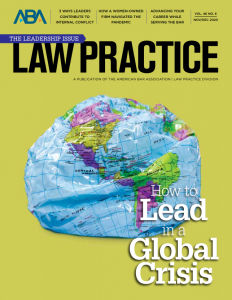LP Magazine – Profiting From Nonprofit Board Involvement
 A favorite business development endeavor for many lawyers (me included) is involvement on a nonprofit board. It can be time-consuming, potentially expensive and sometimes frustrating, but it is a do-good activity that ideally is tied to an area of interest and passion. In my November/December 2020 marketing column in Law Practice, I write on Profiting from Nonprofit Board Involvement.
A favorite business development endeavor for many lawyers (me included) is involvement on a nonprofit board. It can be time-consuming, potentially expensive and sometimes frustrating, but it is a do-good activity that ideally is tied to an area of interest and passion. In my November/December 2020 marketing column in Law Practice, I write on Profiting from Nonprofit Board Involvement.
The heart of my column comes from conversations with leaders of BoardAssist, a nonprofit itself that matches prospective board members with nonprofits in the New York metropolitan area (including New Jersey and Connecticut). Cynthia Remec, the executive director and founder of BoardAssist, is a former attorney who started her career at Pillsbury Winthrop and Weil Gotshal. I also received valuable input from Richard Hall, a partner at Cravath, Swaine & Moore, and a longtime member of its board of directors.
Like many aspects of our lives, nonprofits are reeling in the midst of a pandemic where time, money and resources are hard to come by. For board members, there is the teeny, tiny silver lining of being able to conduct most of these meetings from the comfort of home. However, that in-person human interaction is lost. And I’ve heard a number of people lament that they miss the free snacks at meetings. I, myself, will trade sitting at home in sweats and buying a box of munchkins out of pocket. But, seriously, it is true that removing the travel element (sometimes involving getting on a plane) can make donating your time simpler and easier. Bottom line—nonprofits need us to step up now, more than ever.
My wife and I both serve on multiple nonprofit boards tied to various areas of interest, both personal and professional. We also are both in leadership (on the “executive committee”) on a board as well. “Do you have a board meeting this week?” is a part of our typical dinner conversation. The amount of time and money expended to support those organizations sometimes feels out of control. There is definitely an expectation that leaders will pony up more than the board in general. We also like to cross-compare the quality of our respective boards—do they show up? Do they pony up? Are they smart, successful business people in the “real world?” Or do some have ulterior motives that might be less than pure? The bottom line for us is we are doing it for the right reasons, and showing our kids the importance of giving back. I often like to say that is better to be part of the solution than complaining about the problems.
My column addresses the well-known board equation of “time, talent and treasure.” Evaluating what nonprofit board might make the most sense to match your passion and goals. You may learn some business development tools that might not be overtly obvious. Find a fit. Join a board. Prospective and current clients like to see a law firm that is engaged in the community. It’s a good time to give back.
 Marketing Attorney Blog
Marketing Attorney Blog

